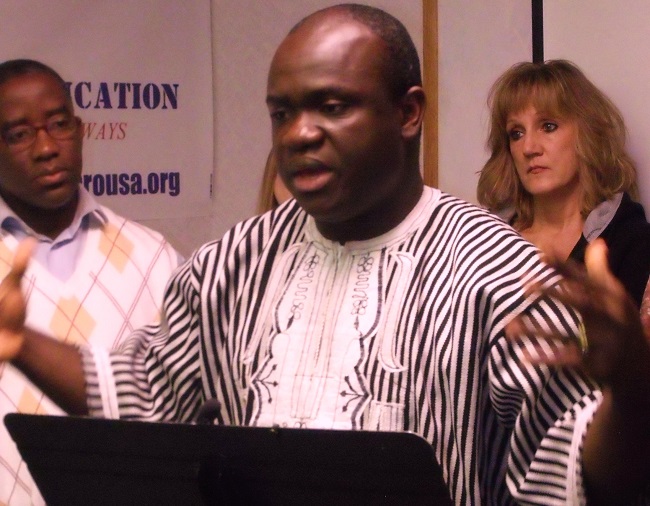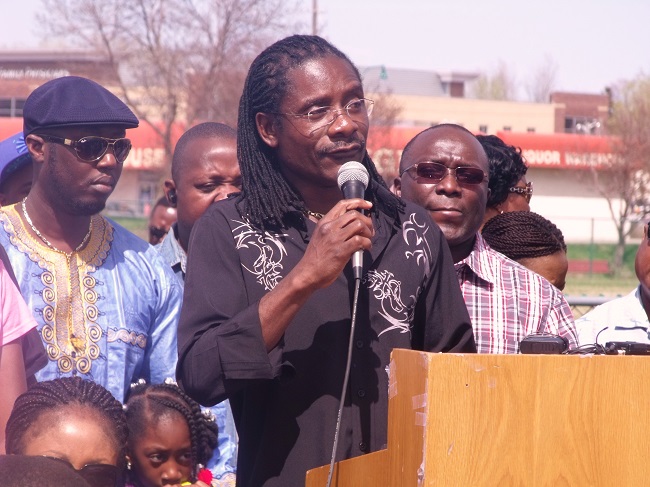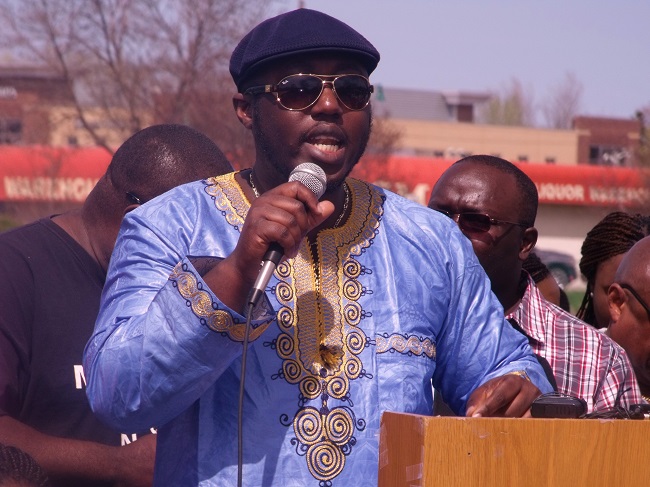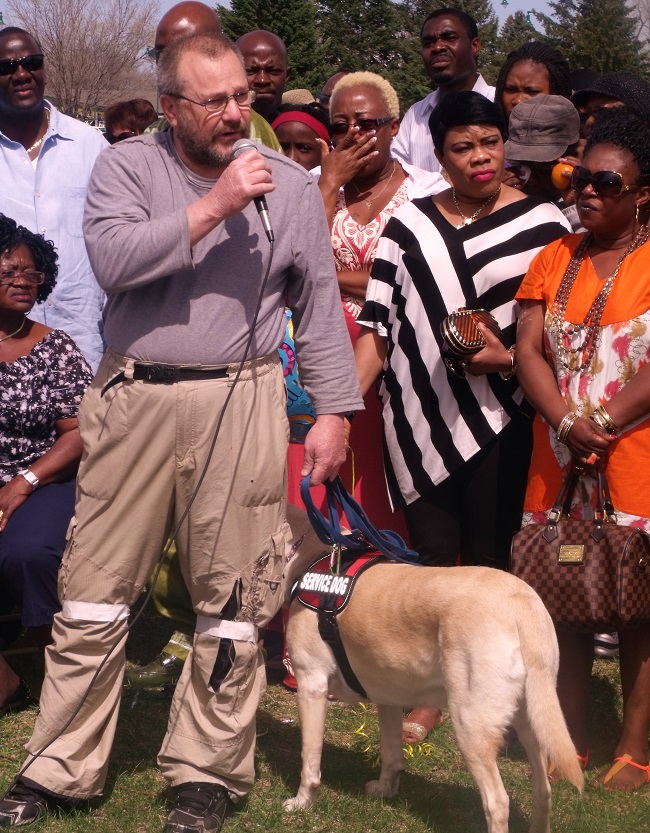‘We will seek justice for Barway’
A Liberian pastor received warm applause last weekend from Americans and people from the African immigrant community here when he declared that neither his ministerial organization nor the Liberian immigrant community, intends to defend a perpetrator of heinous crimes, but that the goal of everyone, is to seek justice for late Barway Collins, killed last month; writes James Kokulo in Crystal, Minnesota.
“We are not here to defend a perpetrator…we are here to seek justice for Barway Collins,” said Pastor Alexander Collins, head of the Liberian Ministerial Association (LMA) in Minnesota. “We don’t want this tragedy to happen to our community again,” said Collins, also pastor for the Redeemed Life Church, located in Mounds View, near Minneapolis, Minnesota.
Rev. Collins’ statement came as a direct reference to Barway’s father Pierre Collins who police have charged with the murder of his 10 year-old son. But Pierre Collins has continued to deny his involvement in Barway’s killing despite video and other electronic evidence police said they have against him.
Rev. Collins further observed that the Liberian immigrant community here will not tolerate criminal activities and that the Liberian community stands together on the Barway’s tragedy, adding, “Whoever did this [killing] to Barway will be prosecuted.”
Asked by this writer if he holds a family relationship with Barway’s father, he answered in the negative. Like many people, he said, he was drawn to the family by the recent tragedy. He’s among community leaders here who have been at the forefront of search efforts since Barway went missing March 18th, followed by the discovery of the teen’s body in the Mississippi River.
In a rather bizarre twist, Pierre, according to national news requested a judge’s permission to allow him go and view his son’s body before interment but a prosecution lawyer said that’s not possible for fear it may triggered an unnecessary controversy.
Collins’ warning, no doubt is directed at parents and would-be “Criminals” within the tight-knit Liberian immigrant community where church and neighborhood leaders often find themselves compelled by cultural practices, to seek the release of their people caught breaking the laws.
It may have also come as a result of criticisms against these leaders members of their own community initially viewed to be somewhat lenient with Pierre Collins, the man some still suspect may have been involved in Barway’s murder. To such people, showing empathy to Pierre is, but an unnecessary fondling of a man they think hurt his family.
If anything, they say, Barway was the real tragic victim in this scenario and therefore should be the person that deserves empathy and not Mr. Pierre Collins. They want all to join together and seek justice for the deceased so his soul can rest in peace.
In Liberia, and perhaps the whole of Africa, where people generally regard community elders (including clerics) as supreme leaders, it is a cultural thing to have village or town’s elders go to the authorities and plea for mercy on behalf of someone who is in violation of essential cultural norms of the land; this includes felony, among other lesser crimes.
For many community elders, this of course, can be a moment of test, and also a responsibility one can’t afford to ignore no matter the gravity of the alleged crimes involved. But whether such traditions can work in the Great United States, is another question.
It was therefore no surprised when weeks into the disappearance of Barway, a Liberian-immigrant pastor, Harding Smith of the Spiritual Church of God, decided to stand by the Collins’ family in its time of need, thereby appealing to Minnesotans to stop judging Pierre “Guilty” and refocus their energies on the search for then missing 4th grader, Barway.
“The community is turning on the family when they should be focusing on finding Barway,” he maintained. “This man [Pierre] has been charged and found guilty already in the minds of most people,” Rev. Smith, also head of Minnesota Acts Now, told a news conference in Crystal, April 6th. As he spoke, Pierre and Yarmah stood next to him, nursing their two young toddlers.
At last Saturday’s memorial, held in Crystal, Smith further buttressed Rev. Collins’ earlier statement and said, “We will not rest until all the perpetrators are brought to justice,” statement that some think somewhat differs from the Collins family pastor’s previous stance in the case.
Rev. Smith informed the crowd that “ritualistic killing” didn’t serve as a factor in Barway’s murder. He explained he personally inspected the remains of the victim but observed there was “No parts missing.”
The clarification, he maintained, was meant to prevent the spread of any speculation within Liberian immigrant community that Barway’s murder may have been motivated by ritual purposes, practices now common in Liberia nowadays since the end of the war.
There was an array of speakers at the occasion, and among them were OLM executive Mamadee Sesay, Abdulliah Kiatamba, head of a Minnesota African immigrant organization and Mohamed Dukuly, Imam of the immigrant Muslim community in the Brooklyn Park-Brooklyn Center areas. Others were: Tony Leewaye, an official of UNICCO; Al-Hussein Fadiga, chief executive officer of the Minnesota-based Radio Africa (formerly TMZ Radio International), and award-winning broadcast journalist, Al Jerome Anastas Chede.
The various speakers warned against a “divided community,” especially during this critical period and appealed to members of Liberian immigrant community to treat the Barway tragedy as a Liberian matter and not view same as a “Krahn, Muslim or Christian” issue.
For nearly 14 years of bloodbath, the country Liberia was partitioned by various rebel factions competing for control of “absolute power” and the country’s rich mineral wealth. During this period, rebel fighters and civilians alike often sought alliances with militia and ethnic groups for their collective and individual protections. That was after the central government fell. Even long after those dark periods, some Liberians still carry that “Tribal spirit” and would quick to approach certain matters from a tribal view point instead from a national stance.
“Let us not divide ourselves over this tragedy…this is not a Grand Gedeh situation but a community issue,” said a Grand Gedeh Association representative who revealed that Barway is from Grand Gedeh, the region slain Liberian president Samuel Doe hailed. Like the rest of the speakers, he encouraged all Liberians to come together and give Barway a decent funeral.
At the same time, a Crystal, Minnesota resident touched by the tragedy has offered a plot of land from his family’s burial ground in Crystal, free of charge for Barway’s burial.
Mr. Gary Dye who spoke briefly at the occasion provided newsmen his contact information and said the victim’s relatives should contact him if they wish to take the offer. Dye was applauded heavily by the audience for his kind gesture.
Barway’s funeral was expected to take place today, Saturday, April 25th, but sources told this writer it has been postponed to a later date.
The postponement comes two days after the “Search for Barway Leadership Team” made public appeal to cities and states’ officials to extend burial time in order to allow Barway mother’s arrival for the final home-going.
Photos: James Kokulo Fasuekoi






